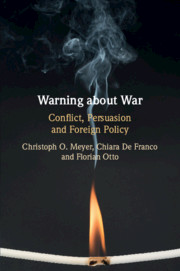Book contents
- Warning about War
- Warning about War
- Copyright page
- Contents
- Figures
- Tables
- Acknowledgements
- Chapter 1 Conflict Warnings as Persuasion Attempts
- Chapter 2 A Theory of Conflict Warning as Persuasion in Foreign Policy
- Chapter 3 Inside-Up Warnings within States and International Organisations
- Chapter 4 Outside-In Warnings
- Chapter 5 Outside-In Warnings
- Chapter 6 (Mis-)identifying Warnings and the Problem of Hindsight Bias
- Chapter 7 What Makes Individual Officials Persuasive Warners?
- Chapter 8 Explaining Differences in Persuasiveness
- Chapter 9 Warning within EU Institutions and the Ukrainian-Russian Conflict of 2013–2014
- Chapter 10 When Are Warnings Heeded and What Can Warners Do?
- References
- Index
Chapter 6 - (Mis-)identifying Warnings and the Problem of Hindsight Bias
The Case of the Rwandan Genocide
Published online by Cambridge University Press: 23 August 2019
- Warning about War
- Warning about War
- Copyright page
- Contents
- Figures
- Tables
- Acknowledgements
- Chapter 1 Conflict Warnings as Persuasion Attempts
- Chapter 2 A Theory of Conflict Warning as Persuasion in Foreign Policy
- Chapter 3 Inside-Up Warnings within States and International Organisations
- Chapter 4 Outside-In Warnings
- Chapter 5 Outside-In Warnings
- Chapter 6 (Mis-)identifying Warnings and the Problem of Hindsight Bias
- Chapter 7 What Makes Individual Officials Persuasive Warners?
- Chapter 8 Explaining Differences in Persuasiveness
- Chapter 9 Warning within EU Institutions and the Ukrainian-Russian Conflict of 2013–2014
- Chapter 10 When Are Warnings Heeded and What Can Warners Do?
- References
- Index
Summary
Rwanda has become the paradigmatic case for a missed opportunity to prevent genocide and human suffering on the largest scale, and subsequent analyses of this case have shaped a significant part of the practical and academic thinking. The chapter contests the dominant argument that Rwanda was a straightforward case for heeding plenty, early and high-quality warnings. It argues that indications need to be distinguished from actual warnings and persuasiveness of warnings needs to be empirically studied rather than assumed. The analysis shows that most sources cited in the literature did not contain an actual warning and gave a more ambiguous picture than is claimed by proponents who argue that lack of political will, not warnings, was the problem. It is suggested that hindsight bias partly explains why the availability of warnings has been overestimated, whereas the diagnostic difficulties in this case were underestimated. Contrary to expectations, persuasive warning communication appears to be no less of a problem for preventive policy as the will and ability to respond. The findings suggest that renewed attention is needed to the challenge of making knowledge, relevance and action claims about impending mass atrocities that are clear and persuasive enough.
Keywords
- Type
- Chapter
- Information
- Warning about WarConflict, Persuasion and Foreign Policy, pp. 162 - 185Publisher: Cambridge University PressPrint publication year: 2019

